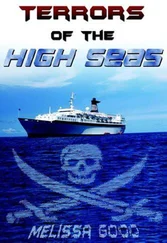"The heat and smoke made it more and more unpleasant to remain on the ship, and it was even worse when the ammunition piled round the guns began to go off. These explosions, however, did not do much damage. A large number of small splinters were scattered which, for example, penetrated the bridge from below.
"The ship's company assembled in perfect order on the fo'c'sle, whither the wounded also had been brought. I asked for three cheers for His Majesty and then the flag hymn and 'Deutschland, Deutschland über alles' was sung. Even the wounded joined in. One man asked for three cheers for the officers.
"Just before 3 o'clock S.M.S. Danzig (Captain Reiss) came up and sent boats to us. As has already been mentioned, we had not suffered so severely amidships and it was therefore possible to lower the Ariadne's cutters also. The first to be put in the boats were the wounded, who were lowered from the fo'c'sle with ropes. As it gradually became impossible to remain on the fo'c'sle the rest of the ship's company jumped into the sea at the word of command. Some of the stronger swimmers swam all the way to the Danzig and Stralsund (Captain Harder), which had also approached. The non-swimmers, who had lifebelts and rafts, were picked up by the boats. Meanwhile the fire on the ship - which was gutted - had died down somewhat, and the explosions were less frequent. I therefore betook myself to Stralsund with a few men who had returned in Ariadne's boat, in order to request her captain to take Ariadne in tow. However, just about this time Ariadne suddenly heeled over to port and then capsized to starboard. The keel was visible for some time above the water."
If it was already known that the Heligoland Bight was insufficiently protected, because our scouting did not extend far enough, this day brought us the knowledge that a determined raid of the enemy against our weak forward patrol must inflict loss upon us every time. By the repetition of such surprises it might gradually be worn away altogether, while the Fleet got very little value out of its patrolling operations. The continuous employment of personnel and material on patrol work in the lengthening nights weakened both and thereby prejudiced the efficiency for their main task - to fight the enemy fleet. The unmolested irruption of the enemy cruisers and destroyers and the complete freedom of movement they had enjoyed in the Heligoland Bight must be made much more difficult, as also must the perpetual harassing operations of English submarines, although the latter had not hitherto displayed any great skill in torpedo work.
Far-reaching changes were made in both directions. As regards the patrol service a large number of armed fishing steamers were secured and prepared with the utmost despatch. They had previously been employed only in the harbour flotillas, which looked after the security of the estuaries. Moreover, in the middle of September two large minefields were laid west of Heligoland, which increased the danger for the enemy and offered a safe retreat for our patrols when they were hard pressed.
On September 13 an English submarine, "E 9," succeeded in torpedoing the cruiser Hela south of Heligoland. The ship took twenty minutes to sink, so that there was time to save the whole ship's company, and our losses were limited to three men killed where the torpedo exploded.
The minefields before Heligoland proved effective, and in conjunction with progressive defensive measures such as aeroplanes and the equipment of our patrols with weapons which could be employed offensively against submerged submarines (such weapons were wholly lacking at the beginning of the war), kept the inner area so clear that the danger from submarines came at last to be quite a rare and exceptional possibility.
1.Naval charts are drawn squared, to simplify the location of places according to length and breadth, in degrees and minutes. This facilitates delivery of reports or commands and the identification of places on the chart. The size of the squares, a side of which represents five or ten sea miles, is governed by the scale of the chart.
Chapter 5
The Autumn and Winter Months of 1914
Table of Contents
The affair of August 28, 1915, could be regarded as the preliminary of some enterprise on a larger scale, an enterprise in which our Fleet would start at a disadvantage if the enemy held the initiative. He would thus be able to make full use of his superiority while we had to undertake the difficult deployment from the estuaries of our rivers. By choosing his own moment the attacker had the advantage of previously sending out his submarines in large numbers to suitable stations. As the result of their frequent visits to the Heligoland Bight, as well as their experiences in the August action, they must have acquired sufficient data to be employed effectively.
The defensive attitude imposed on our Fleet was a direct help to such a plan. To anticipate it it was therefore obvious that our High Command would desire greater freedom of movement in order to have a chance of locating parts of the enemy's forces. This could only be done if the light forces sent out ahead could count on timely intervention by the whole High Sea Fleet. On the other hand, it was not the Fleet's intention to seek battle with the English Fleet off the enemy's coasts. The relative strength (as appeared from a comparison of the two battle lines) made chances of success much too improbable. Taking, battleships only, the superiority on the English side was seven compared with our total number of battleships, thirteen, and therefore more than fifty per cent. Our older ships of .Squadron II, which dated from the pre-Dreadnought period, would be opposed to an English squadron composed of ships of the "King Edward VII" class of equal fighting value.
The Supreme Command attached more importance to the security of the sea front, which was entrusted to the Fleet, in this early period of the war than to the damage which it might possibly be able to inflict on the enemy's fleet. The restrictions imposed on the Battle Fleet were therefore adhered to.
The attempts to damage the enemy by guerilla operations were continued, and in addition cruiser raids against the English coast and the Skagerrak were planned. The U-boats carried their operations ever farther afield, and at last they had their first success on September 8, when "U 21 " (Hersing) sank the light cruiser Pathfinder at the entrance to the Firth of Forth. This was fol- lowed by the great feat of Weddigen when, with "U 9," on September 22, he made a bag of the three armoured cruisers Cressy, Aboukir and Hogue, twenty nautical miles N.W. of the Hook of Holland.
Weddigen's name was in everyone's mouth, and for the Navy in particular his achievement meant a release from the oppressive feeling of having done so little in this war in comparison with the heroic deeds of the army. But no such victory had been required to reveal completely the value of the submarine for our warlike operations, especially after it had given such unexpectedly convincing proof of its ability to remain at sea.
Favourable news came from abroad also. The Emden had begun her successful operations against English merchant ships in the Gulf of Bengal,- and in East Africa the light cruiser Konigsberg had sunk the Pegasus and so avenged the bombardment of Dar-es-Salaam.
About the middle of September the squadron of older ships which had been newly-formed at the beginning of the war had so far progressed in its training that it could be commissioned for service in the North Sea. The ships were not themselves fit to take part in a Fleet action, but they could take over part of the duties of patrolling the estuaries and keeping these open against attempts at interruption when the Fleet was at sea. However, they were never employed on this service, for they were not kept long in commission, as their ships' companies were needed urgently elsewhere later on. However, the work spent on them had not been wasted, for they gave the Fleet well-trained men for its new ships, and their presence in the Baltic in the first weeks) of the war had the effect of giving our Baltic forces much greater importance in the eyes of the Russians than was justified by the facts. This, and possibly, too, their lack of confidence in their own efficiency, may be responsible for the fact that the Russians refrained, from taking the offensive.
Читать дальше












